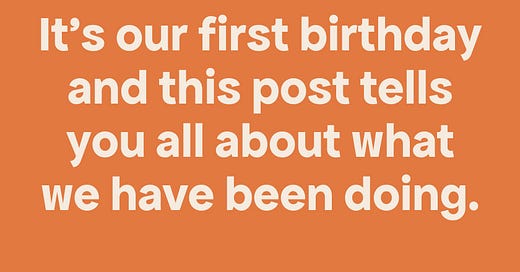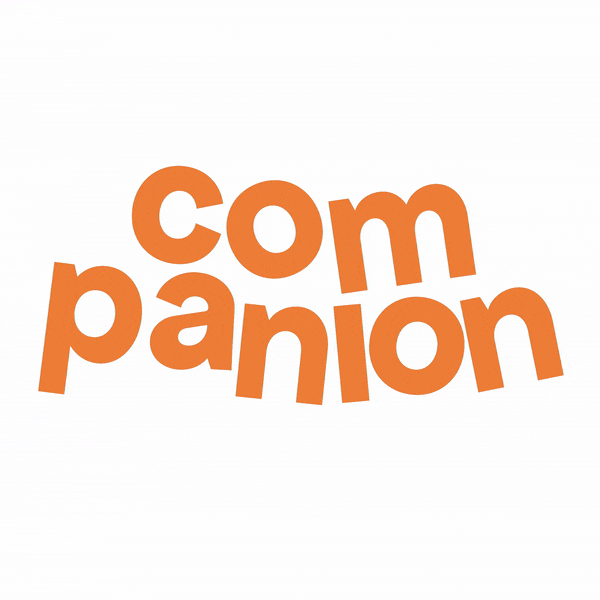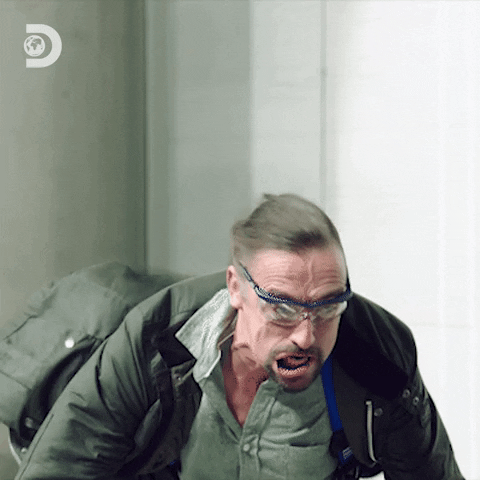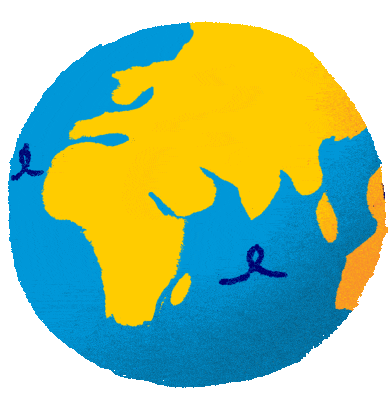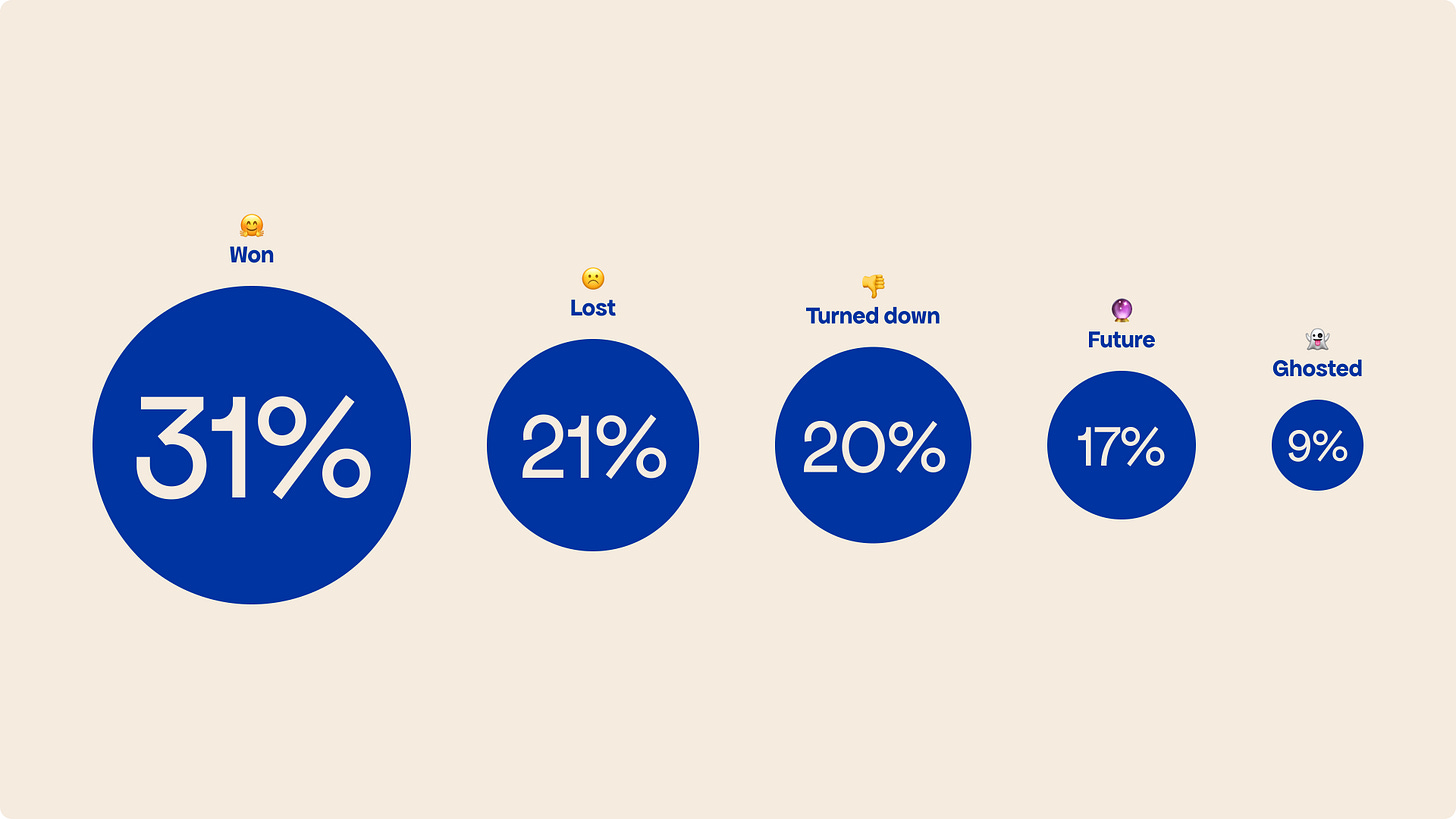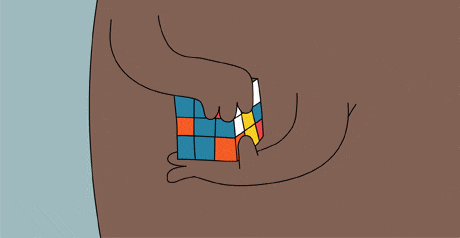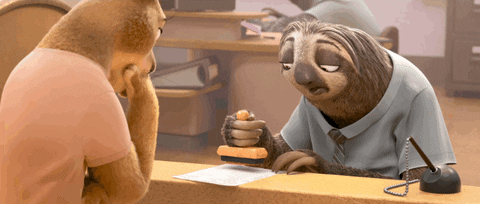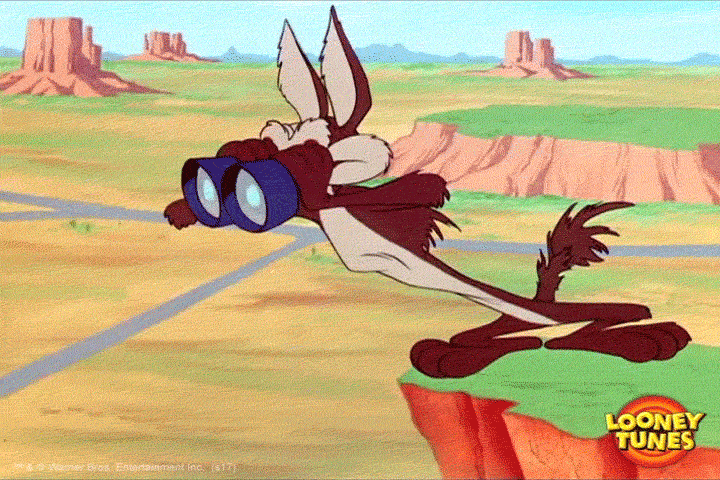Companion turns one today. Here's a year of (official) business.
It's one of those posts. The highs, the lows and the in-between.
Compan-you believe it’s been a year!?
Alright, bad puns aside, in the spirit of the way Companion operates and wishes the world to be, we are lifting up the curtain on our first year of 'proper business' (ish), in the hope that by sharing our experiences, it might help someone else.
Or just provide a post for the people who know what they are doing to point and laugh at on Twitter.
This isn't a guide, how-to, or any kind of ‘right way’ — more just the ramblings of one person’s fortunate experience over the last year or so that might give you some ideas if you're starting out.
Companion is officially one year old. The company was formed in November 2020, when I (Myles) decided to take the plunge and start something after some early encouraging signs and pressure from friends and colleagues.
Unofficially we are 442d 18h 59m 3s old — this is the date from which I left my previous role and resigned myself to the fact that after years of resisting, it was time to start something and try to fulfil my own vision for what a design studio could be. Officially we have been a company since November 30th 2020.
Companion didn't really get started properly until January 2021 — when I had just taken on a rather large project, brought in a freelance developer friend (Robin), and thought 'great, that one is going to last us until the winter, we’re good to go!' — having up until that point just been consulting on a few projects.
But then the phone (and email inbox in reality) didn't stop ringing... and it’s been quite the ride ever since.
🦊 What is Companion?
Companion is a digital product design studio that partners with start-ups and established companies to create new futures.
✨ Our Purpose
Our collective purpose is to make positive change: even if it's one tiny change at a time.
🚃 Our Mission
Our mission is to enhance the world around us by designing services and products that inspire, disrupt established norms and create a better future for people and the planet.
🔭 Our Vision
We envision a world where digital experiences enable people to grow, learn, share joy and fulfil their dreams.
🧡 Our Values
We partner with people who share our values: openness, curiosity, togetherness and a desire to do better for the people and world around us.
☁️ Why did you start Companion?
I founded Companion because I believed that great digital work could be done in a different way to what I saw out there, and what I and others I know had experienced.
Too often had I heard from friends and peers, as well as experiencing myself, that many agencies spoke a good word publicly, but beneath the surface laid all sorts of problems that were contrary to the communications they put out online.
I had a desire to create a company that contributed to the communities it was a part of, rather than just take from it or sit idle, and to create a studio where the people that made it benefitted from it (we have a mid-term goal of setting up a company profit sharing plan).
We want to help fulfil the creative and business potential of companies, collaborators and colleagues — and to go on adventures with them. Not just work on things for a while and go our separate ways, but share the highs, lows and everything in-between as a collaborative unit — helping to launch them and us into our respective futures.
Whether businesses have the seed of an idea or have been there and done it before, we work with them to try and create long-term value and fulfil their potential: both creatively and as a business.
🤔 What have you been up to?
In the last year we have worked on 19 projects for 13 different clients, with 6 different creative studios. We have employed 6 people full-time (👋 Axelle, Alexandra, Elena, Josh, Willem + myself), worked with over 20 different (lovely) freelancers and moved into an office space in London.
We are currently working on our site and getting that launched, as well as a slight ‘rebrand’ (some of which you can see in this post) — but it’s a bit of a slow process when you have lots of client work going on!
The majority of our work comes in via the digital side, that is taking on the end to end design and build of a product or website — but we are increasingly working with our clients on evolving their digital identities and helping them to move from a static brand world into a more fluid one — and in some cases rebranding or starting from scratch.
Some of the things we have worked on:
an art app bringing greater transparency to the primary art market
an educational platform for creative entrepreneurs
an installation for a cycling company visualising their riders data
an app for original hour-long audio features
a direct to consumer cannabinoid company
a new couture fashion house in Milan
various playful experiments for an advice platform and much more
We’re not trying to create a niche for ourselves where we take the same kind of work and do it again but slightly different — our current path is us trying to go broad, try our hand to lots of different things and see what comes of it.
Hopefully our site launches not too long after this post. I’m fairly sure the team will be banging down my door if it isn’t out by the end of January, as I’ll be the one holding it up by not writing the copy!
👀 A view into our finances
We are yet to finish our first year’s full accounting so we won’t be sharing this in full right now — but we will in March 2022.
Here is a little snapshot for now:
64% of our outgoings has been spent on freelancers. This is very high, but it’s what has enabled the team and the studio to grow. At one point we had 4-5 projects going at once — which was great because it has enabled us to build our portfolio of work, grow the full-time team and build a bit of cash reserve — but it does mean we had a large outlay here.
19% of our outgoings has been spent on salaried staff
5% of our outgoings has been spent on the office (rent and furnishings)
4% of our outgoings has been spent on software, services and subscriptions
1.5% of our outgoings has been spent on capital assets
(yes I know, this doesn’t add up to 100%, the remaining %s is on a random assortment of things)
We expect that by the year end some of those %s are going to change around a bit, and in year two we expect that our outgoings will come down from freelancers significantly and instead head towards the internal team.
📈 We’re trying to be a ‘better’ business
We aim to contribute 5% of our annual revenue towards organisations and causes that create a better future for all. This contribution is made up of a combination of free team resources and monetary contributions.
One of our business practices is that every financial year we want to contribute 5% of our overall revenue (prior to profit) towards organisations we are passionate about.
We want to build a responsible, sustainable business that not only works for us and our team, but also has an impact on the wider ecosystem that we are a part of.
The 5% is made up of direct financial contributions to organisations, discounted services for charities and company resources pro-bono for organisations that need it.
So far we have made contributions towards the following: 1% For The Planet, Arthouse Unlimited, Creative Lives In Progress, Feedback Global, Rewilding Britain and Hackney Quest.
The majority of these contributions have been financial, however with Hackney Quest we helped them launch New Futures HQ — a new programme designed to introduce young people to different career opportunities and be supported to build the right skills to get there.
We worked with NFHQ and Studio Temper to create a launch site for them that captured the interest of businesses and represented the tailored programme they offer.
This year we are currently at about 2.75% of the total 5% contribution and with our year end approaching we’ll be looking at getting that up to the 5%.
If you are an organisation that could be benefitted by this or are interested in learning more, please contact hello@companion.studio.
📩 New Business
We have had 66 project enquiries and have worked with 21, lost 14, turned down 13, have a potential future project with 11, ghosted by 6 after initial contact and we are in active discussions with 4.
We have been fortunate that all of these enquiries have come through word of mouth, referrals from friends and existing clients or people stumbling across our website.
There were definitely some moments in the year where things fell completely silent, particularly in the six weeks where everyone goes on holiday around August, but we’ve managed to pull through to now with no outreach and a website with no work on it — which is very fortunate.
In 2022 we’re hoping to do a bit more of active outreach ourselves to perhaps craft our own direction a touch more.
💻 Studio Life
It’s been a rollercoaster ride to say the least, and I am quite tired (!), but thankfully the rest of the team are pretty much keeping it level and not working any more than 40 hours regularly.
We do have a TOIL policy which has given out a total of ~7 days this year for overtime, which isn't ideal and it wasn't great at the time — but I am trying to learn from my mistakes that caused it — namely not estimating something properly.
We have hybrid working because as Josh our developer says — working from the office five days a week is a fat cat construction created to monitor employees — so we’re in Tuesdays & Thursdays but otherwise you can work from where you please.
We have a flexible working hours policy with core hours of 10am-4pm, outside of that just do your thing.
If people need an appointment, to head off early, to do whatever it was that day that made things a little more convenient for them; we encourage it and don’t make them feel bad for it.
We are still working on company policies, perks, benefits and all that jazz. We’ve recently integrated Spill which we’re enjoying as a team, and we have the standard things like Cycle to Work scheme, carbon offsetting through Ecologi and Headspace subscriptions for all.
The office isn’t anything fancy, but it’s nice to get some face time with each other. We still think that there’s a place for working in person with each other, but we don’t see it as something we will ever go back to doing five days a week by default.
We track our time on Harvest to try and workout if we’re generally estimating OK on projects or if we’re running over like mad. We started doing this around April 2021.
We’re currently at 69% billable hours (9,925) across the team (we don’t really pay attention to this number).
Our top five timed categories (this post is exciting, isn’t it?) are:
Design (2,606 Hours)
Front-end (1,452 Hours)
Back-end (867 Hours)
Administration (658 Hours)
Concepts (617 Hours)
Bet you’re positively thrilled now you know that information.
😷 Setting up during COVID
The first question I am often asked is: how was setting a business up in COVID, is that not insane?
The answer is I guess yes and no! I think by November of 2020 our sector (digital design) had gotten past the initial panic of freezing all spending and companies had weathered the summer and realised that actually, if anything, they needed to put more resources into their digital platforms.
I saw this as really a time that was as OK as any, for me personally, as I thankfully had a financial buffer and my direct support network were all coping OK with the pandemic.
I think setting up a business by yourself at any time is daunting, COVID or no COVID.
Over the last three to five years, even when in full-time employment, I still did freelance projects which gave me the savings to do this. I had prepared myself to not take any pay until March 2021, and in many ways because of the lockdowns I was spending less day to day, so I felt OK with the runway that gave me to get things going: I just saw it as an investment in the business.
I think if a project hadn’t come in relatively soon after that, I would have been more worried, and if I was still not taking any income, or seeing the chance of, come March — I definitely would have felt differently.
Starting working with a remote team and only conducting interviews and client meetings through a screen was a bit odd in places, but again I think by the time it came around to me doing that everyone had gotten used to for the last ten months or so of being in that situation. I didn’t feel out of place doing it.
The challenges that working remotely pose is an entirely different subject, and I think really the areas I think it lacks the same ‘flow’ as working in person is:
It’s much harder to onboard people to the company.
It’s much harder to guide, teach or learn from others when working only virtually. For experienced members of a team, this is fine, but I do have a big concern that individuals with less experience are going to find it even harder to break through in our industry: and they’ve already got it pretty hard if they don’t have three years’ experience as a junior… (again, don’t get me started).
Some issues that happen on a project can be solved by a quick chat in person, but in Zoomsville, scheduling it in and then trying to solve it without being able to as easily sketch, iterate ideas or work through a bug is harder.
Day-to-day communication in an office can help get to know people better and build the culture of the team quicker.
I appreciate that my perspective on this is unique and fortunate: not everyone has savings or can afford to have savings or have the lack of dependencies I have — setting up a business is a long, tiring process that is not welcoming or accessible to the majority of people (I think for example if I had a mortgage or dependent to look after, things would have been different).
I don’t know what the path to opening that up looks like, but I do wish there was more financial methods for people to have the time and space to get new businesses and ideas off the ground without having to sacrifice so significantly.
🤦♂️ What I have learnt
I wanted to spend a little bit of time reflecting upon what I have learnt, or what has challenged me/the studio the most. Again, this isn’t advice or a how-to, just my personal experience.
As a founder, you’ve got to love solving problems.
Don't go starting a design studio thinking that you're going to have a ton more time to design and be creative. For me, my role is much more about problem solving and making decisions on the fly in the best interests of the team, client and project — and balancing all three of those at once.
Sometimes not all of those things align, sometimes the problems one pose go directly against another. These problems can be from the minor of the building’s bathroom not having a toilet roll holder to the majors of what projects to work on and not work on.
It’s really hard to be ON all the time, so build some time in to focus.
The hardest thing I have found is finding time to focus on specific tasks when there's so many meetings to be in and things to discuss. The best thing I did was to block out 8:30-9:30am every day in my calendar for me to just focus on something without having to hop in a meeting.
Constantly tap your watch/screen/whatever it is.
For the first eight months maybe two or three times a week I looked at our finances: I checked what was coming in, what was going out and what I hoped might be coming in soon and I forecasted that over the coming financial year. Having this attention on the finances gave me an understanding of where money was going, what needed to change and also it reassured me in times of stress.
If I didn't have a big Google Sheet where I could see our runway easily or what effect gaining or losing work would do, I probably would have been insanely stressed all the time. I used the template on here with a few tweaks that made it more applicable to our business.
If nobody is miserable, the lights are on, clients are happy and the work’s good: then you’re probably doing OK. Don’t panic. You can build from there.
Everything orbits around me and I don’t like it.
Fairly obvious I know, but as the founder and lead, you're going to be looked at for direction and more often than not for a while you'll be the bottleneck.
In our case, I didn't really get time to document all of my processes and pass them onto the team, nor do those processes with them or teach them. This leads to me (badly) saying that I will do it and taking longer than is needed to do it. Instead it's better to just get things moving and tweak than to be the bottleneck and slow everyone down.
Don’t take risks that you can’t afford if you’re hoping they bring you fortune quickly. They don’t usually pay off immediately.
Running a studio means constantly assessing risk and problem solve. Sometimes a project comes in that is not in the right place for you now (perhaps they are pre-funding), but could be in the right place for you.
You may take it on with the hope that they continue on in that journey with you if things go well, or you may even just take on a small job that pays the right amount but isn't what you usually do as a favour to someone with the hope that it brings further work. Both of these can happen, but they aren't a guarantee and sometimes it can take a very, very long time to come to fruition.
So don't take risks on things that rely on those situations happening and you getting further work via those contacts right away.
As a founder: learn to listen, step back, and don’t freak out over mistakes (or subsequently micromanage if they happen).
People don’t always do what they say they’re going to do, or things won’t always go the way you hope it’s going to.
Just accept it. Don’t then become bitter and not trust people. Instead learn from mistakes and put procedures and guides in place that help it go right next time.
Don't punish people for doing something that you wouldn't have done or micromanage people because you don't trust them for whatever reason. Instead guide people and lift them up, encourage and be constructive.
Find people that are better than you.
Recognise what you are good at and not good at and find people that compliment that. Then work out what those people are good at and not good at, and find people that compliment them — and continue infinitely.
Build a team that has a collective knowledge that compliments each other where they can all learn from one another, but still have areas that individuals can own and excel in.
Recruitment is HARD. Right now? Holy shit.
Competing with the salaries of start-ups (particularly in development) is next to impossible.
You have to create a place where people want to work and have to make it clear to people the upsides of agency work, whilst trying to be not hugely far off on salary.
The search for great people is so difficult, and a lot of people only want seniors or people that can walk in and do a job from day one. As an industry we have to remember that we all started somewhere and worked our way into positions: we cannot just shun people that have no experience or require 'junior' hires to have 2-3 years of experience. Invest in people and help them.
Be honest and transparent.
People appreciate it. There’s enough gamesmanship in the world, we don’t need it here too.
Understand business is business and friendships are friendships.
It can be difficult in a small company to separate the two. But ultimately you can’t be everyone’s best mate and that’s OK. Try not to make everything personal and interconnect things too much.
Don’t work with others (client, collaborators, colleagues) that don’t respect the work and value that you bring to the table.
It never goes well.
Pay people fairly, on time and be transparent about pay when recruiting.
It makes it easier for everyone. Don’t underpay interns either. We know of many places that that pay their interns things such as ‘£400 a month and travel expenses’ for a full-time position in London. It’s a joke, stop doing it.
Just because you create great work doesn’t mean you can underpay people and continue exploit the fact that individuals idolise your studio and want to ‘get the best start’ in their career. It’s exclusionary and bullshit.
And hey, places that give these studios coverage and know they underpay interns or treat their people badly: stop! Thanks.
Finally…
A thank you to anyone and everyone that has had to put up with my crap for the last year, or that has encouraged and supported Companion through this first year.
There’s far too many people to name, but it is massively appreciated — from those encouraging what we are doing and referring work to us, to the ones that are putting up with me day in day out (sorry Jess) — you help keep us going.
I did also ask people on IG + Twitter to submit questions of what they’d like to hear about — some is covered in this, but others will be published soon in a ‘you asked, we answered’ kind of post.
DON’T FORGET TO COMMENT LIKE AND SUBSCRIBE!
Myles

